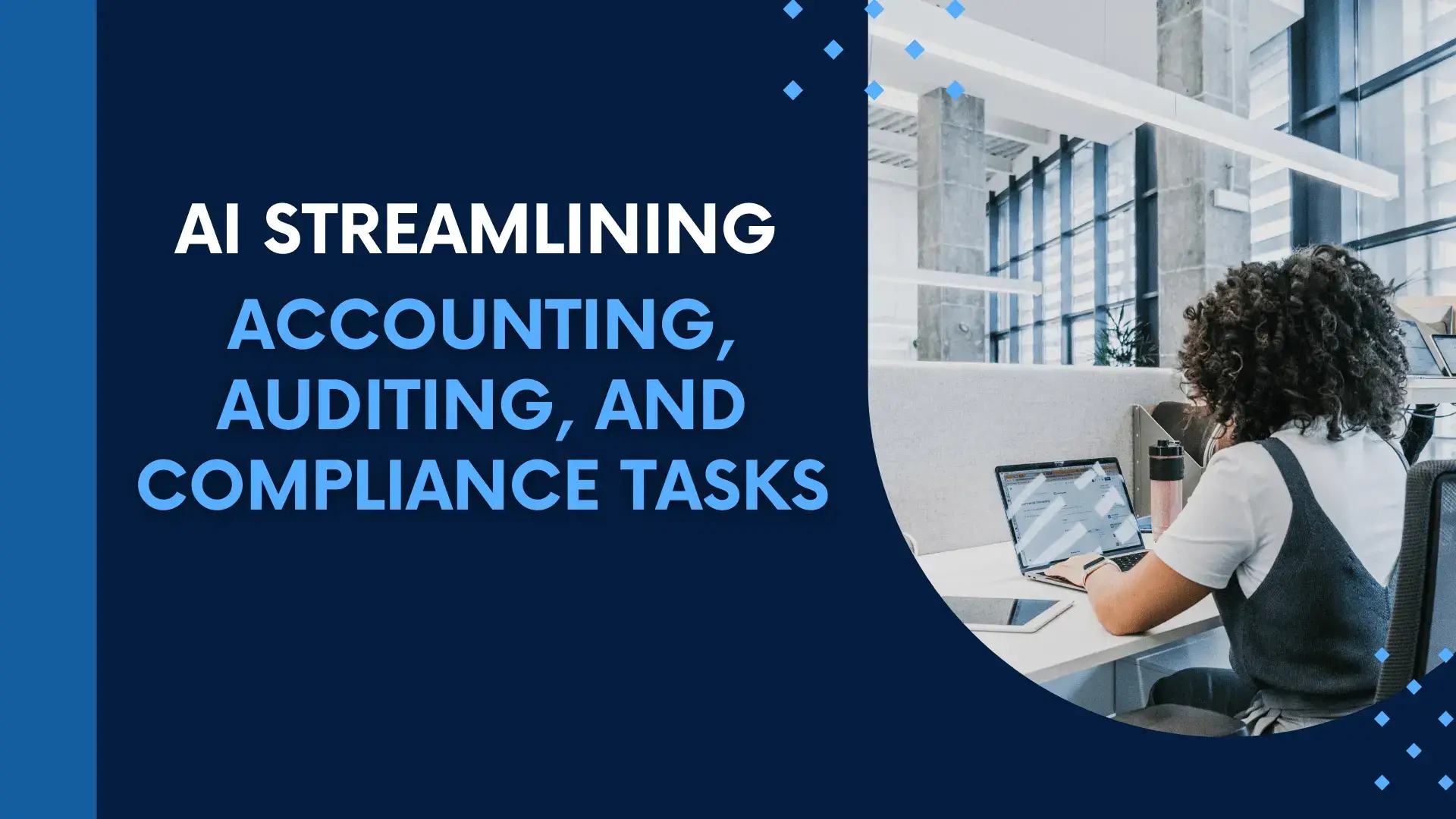How AI Can Streamline Accounting, Auditing, and Compliance Tasks

Artificial intelligence (AI) is revolutionizing industries worldwide, and the accounting sector is no exception. By integrating AI into accounting, auditing, and compliance tasks, businesses can significantly enhance accuracy, efficiency, and regulatory adherence. Traditional accounting involves numerous repetitive tasks, such as data entry, transaction categorization, and financial reporting, which are prone to human error. AI automates these processes, ensuring precision and saving valuable time for accountants. Moreover, AI’s ability to analyze large datasets rapidly allows it to identify patterns and anomalies that may indicate fraud or financial discrepancies. This proactive approach to error detection not only safeguards financial integrity but also enhances overall security.
Additionally, AI’s impact extends to auditing and compliance, where it transforms labor-intensive procedures into streamlined, efficient workflows. AI can continuously monitor transactions, providing real-time insights and ensuring ongoing compliance with ever-changing regulations. This real-time monitoring allows businesses to address potential issues before they escalate, minimizing the risk of costly penalties and reputational damage. Furthermore, AI’s predictive capabilities enable businesses to forecast financial trends accurately, aiding strategic decision-making. Whether you’re involved in custom software development or offshore software development, leveraging AI’s potential in these areas can offer significant competitive advantages and drive operational excellence.
Enhancing Accounting with AI
Firstly, AI can greatly improve accounting processes. Traditional accounting involves repetitive tasks that are prone to human error. By automating these tasks, AI ensures accuracy and saves valuable time. For example, AI-powered software can automatically categorize expenses, reconcile accounts, and generate financial reports. This not only reduces the risk of errors but also allows accountants to focus on more strategic tasks.
Moreover, AI can analyze large volumes of financial data quickly and accurately. It can identify patterns and anomalies that might be missed by human accountants. For instance, AI can detect unusual transactions that could indicate fraud, thereby enhancing financial security. Additionally, AI algorithms can predict future financial trends, helping businesses make informed decisions.
Streamlining Auditing Processes
Secondly, auditing is another area where AI can make a significant impact. Traditional audits are time-consuming and labor-intensive. However, AI can automate many aspects of the auditing process. For example, AI can analyze vast amounts of data to identify discrepancies and ensure compliance with regulations. This not only speeds up the audit process but also improves its accuracy.
Furthermore, AI can provide real-time insights during audits. Instead of waiting for periodic audits, businesses can use AI to continuously monitor their financial activities. This enables early detection of issues and ensures ongoing compliance. For instance, AI can continuously monitor transactions for signs of fraud, allowing businesses to take immediate action when necessary.
Ensuring Compliance with AI
Compliance is another critical area where AI can provide substantial benefits. Businesses must comply with various regulations, which can be complex and constantly changing. AI can help by monitoring regulatory updates and ensuring that business practices remain compliant.
AI-powered software can automatically update compliance procedures based on new regulations. For example, it can ensure that financial reports meet the latest standards. Additionally, AI can analyze business processes to identify potential compliance risks. By addressing these risks proactively, businesses can avoid costly penalties and reputational damage.
Custom AI Software Development Solution For Enterprises
Real-World Examples of AI in Accounting, Auditing, and Compliance
To illustrate the practical benefits of AI, let’s look at some real-world examples. Many companies are already leveraging AI to enhance their accounting, auditing, and compliance tasks.
For instance, PwC, one of the world’s largest professional services firms, uses AI to improve its audit services. PwC’s AI tool, GL.ai, can analyze millions of transactions to identify anomalies and potential fraud. This not only improves the accuracy of audits but also reduces the time required to complete them.
Another example is Xero, a cloud-based accounting software company. Xero uses AI to automate routine accounting tasks, such as categorizing expenses and reconciling accounts. This allows accountants to focus on more strategic tasks and provides businesses with real-time financial insights.
The Role of Custom Software Development
Custom software development plays a crucial role in integrating AI into accounting, auditing, and compliance tasks. Off-the-shelf software may not meet the specific needs of every business. By developing custom software, businesses can create AI solutions tailored to their unique requirements.
Custom AI software can integrate seamlessly with existing systems, ensuring a smooth transition and minimal disruption. For example, a business might develop custom AI software to automate its specific accounting processes. This ensures that the AI solution meets the business’s unique needs and provides maximum benefits.
Offshore Software Development and AI Integration
Offshore software development teams can be a cost-effective way to integrate AI into accounting, auditing, and compliance tasks. By partnering with offshore developers, businesses can access specialized skills and expertise at a lower cost. This can be particularly beneficial for small and medium-sized enterprises (SMEs) that may not have the resources to develop AI solutions in-house.
Offshore developers can help businesses develop custom AI software that meets their specific needs. They can also provide ongoing support and maintenance, ensuring that the AI solution continues to deliver benefits over time. For example, an offshore development team might help a business develop AI software to automate its auditing processes. This not only reduces costs but also ensures that the business remains compliant with regulations.
Benefits of AI Integration in Accounting, Auditing, and Compliance
Integrating AI into accounting, auditing, and compliance tasks offers several benefits. Firstly, it improves accuracy by reducing human error. This is particularly important in accounting and auditing, where accuracy is critical. By automating routine tasks, AI ensures that financial records are accurate and up-to-date.
Secondly, AI enhances efficiency by automating repetitive tasks. This saves valuable time and allows accountants and auditors to focus on more strategic tasks. For example, instead of manually categorizing expenses, accountants can use AI to automate this task and focus on analyzing financial data.
Thirdly, AI provides real-time insights that enable proactive decision-making. By continuously monitoring financial activities, AI can identify issues early and provide actionable insights. This not only improves financial security but also ensures ongoing compliance.
Lastly, AI can help businesses stay compliant with regulations. By monitoring regulatory updates and analyzing business processes, AI can identify potential compliance risks and ensure that business practices remain compliant. This reduces the risk of costly penalties and reputational damage.
Challenges and Considerations
While AI offers significant benefits, there are also challenges and considerations to keep in mind. Firstly, implementing AI requires a significant investment in terms of time and resources. Businesses must be prepared to invest in developing and maintaining AI solutions.
Secondly, businesses must ensure that their AI solutions are secure. This is particularly important in accounting, auditing, and compliance, where sensitive financial data is involved. Businesses must implement robust security measures to protect their AI solutions from cyber threats.
Thirdly, businesses must ensure that their AI solutions comply with regulations. This includes ensuring that the AI algorithms are transparent and that the data used by the AI is accurate and up-to-date. Businesses must also ensure that their AI solutions are regularly updated to reflect changes in regulations.
In conclusion, AI has the potential to revolutionize accounting, auditing, and compliance tasks. By automating routine tasks and providing real-time insights, AI can improve accuracy, enhance efficiency, and ensure compliance. Whether you’re involved in custom software development or offshore software development, integrating AI into your business processes can offer significant advantages. However, it’s important to consider the challenges and ensure that your AI solutions are secure and compliant. By doing so, you can unlock the full potential of AI and drive your business forward.
FAQs
1. How can AI improve accuracy in accounting?
AI can automate repetitive tasks such as categorizing expenses and reconciling accounts, reducing the risk of human error and ensuring accuracy in financial records.
2. What benefits does AI bring to the auditing process?
AI can analyze large volumes of data to identify discrepancies and ensure compliance, speeding up the audit process and improving its accuracy. It also provides real-time insights for continuous monitoring.
3. How does AI help with regulatory compliance?
AI monitors regulatory updates and ensures that business practices remain compliant. It can automatically update compliance procedures and identify potential compliance risks, reducing the risk of penalties.
4. Why is custom software development important for AI integration?
Custom software development allows businesses to create AI solutions tailored to their specific needs, ensuring seamless integration with existing systems and maximizing the benefits of AI.
5. What role does offshore software development play in AI integration?
Offshore software development team can be a cost-effective way to develop custom AI software. It allows businesses to access specialized skills and expertise at a lower cost, making AI integration more feasible.
6. Are there any challenges in implementing AI in accounting and auditing?
Yes, implementing AI requires a significant investment of time and resources. Businesses must ensure their AI solutions are secure, comply with regulations, and are regularly updated to reflect changes.
7. Can AI help in fraud detection within financial processes?
Absolutely. AI can analyze transaction patterns to detect unusual activities and potential fraud, enhancing financial security and enabling businesses to take immediate action when necessary.
8. How does AI provide real-time insights for accounting and auditing?
AI continuously monitors financial activities and provides real-time insights, enabling proactive decision-making and early detection of issues, which improves financial security and compliance.









